
Joe Bonamassa talks Black Rock (intro)
“My goal for Black Rock was pretty simple: I wanted to make the feel good record of the summer. No joke. My last album, The Ballad Of John Henry (2009), was kind of heavy. I'm still very proud of it, but it’s sombre and serious in places. This time out, I said, 'OK, let’s do something young, that has lots of grit and guts and just grabs you by the throat.'
“Surprisingly, we were able to accomplish this in Santorini, Greece, at a studio called Black Rock, thus the album’s title. As opposed to working in Malibu or London, it was a terrific spot to really focus on the music. Cellphones, computers… We were cut off from a lot of typical distractions. After a few days, I didn‘t even know what was going on in the world. I found it very easy to channel my energies on record making.
“Greece is so beautiful and inspiring. The sunsets are spectacular, the street sounds are lively, the people are friendly and genuine - the whole vibe was very conducive to feeling reckless and having fun.
“I got my usual gang together - the amazing producer Kevin Shirley, Carmine Rojas on bass, Rick Melick on keyboards, and Anton Fig and Bogie Bowles on drums and percussion - but I was very happy to welcome some local Greek folk musicians who added different flavours with instruments like the bouzouki and clarino.
“Best of all, I was honored to have my great friend BB King play on a track. How many people get to say that? Not many. I‘m a lucky guy, and I know it.”
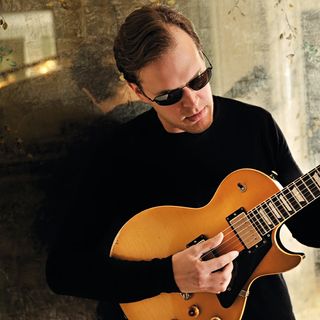
Steal Your Heart Away
“Bobby Parker's a soul and R&B artist from the late ‘50s and early ‘60s. I don’t want to sound like a name-dropper, but I found out about him from Robert Plant, who suggested I do this song. He thought it would suit my voice and the sound of the band.
“What’s interesting is that Steal Your Heart Away was almost on Led Zeppelin’s first album. How’s that for some cool rock trivia? Apparently, the band cut a version of it, but for some reason it didn’t make the album. I don’t know why.
“When I recorded it, I changed the key around and made it sort of punk-rock blues, kind of like what Paul Weller used to do with The Jam. I think it’s a fun song to kick off the album.
“Also, the solo is my favorite on the record. I was going for something more manic than usual, and I found it. I used an old Gibson Firebird V on the solo and a Les Paul for the rhythm track.”
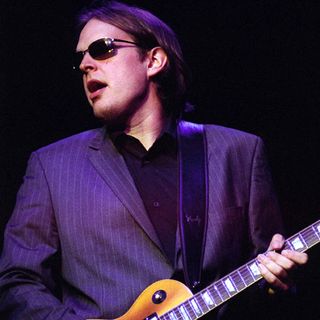
I Know A Place
“John Hiatt’s written so many great songs, but this one really spoke to me. He doesn’t so much write songs as he paints pictures with words and melodies. I liked the lyrical content, the groove, and I thought that I could do a little English-style Cream thing with it.
“It was a challenge to sing, though, ‘cause it’s really high. Basically, I had to find a new place in my voice and feel comfortable with it. It worked out pretty well, so I guess my vocal lessons are paying off.
"That's right, I take vocal lessons - done it for years. There's nothing wrong with it. Hey, are you gonna tell a Major League baseball player he shouldn't have a pitching coach? Whatever gets your game on, you know?"

When The Fire Hits The Sea
“Greece was a muse. It inspired creativity in magical ways that I can't even begin to understand or explain. All I know is, I walked around with my antenna up, and before you knew it I was writing songs at a pretty brisk pace.
“Santorini has these really great sunsets that are very different from anywhere else I’ve ever seen. They’re like these giant fireballs that burn up the sky and then disappear into the ocean. The title, When The Fire Hits The Sea, came to me one day when I was marveling at this incredible sight.
“I really like the slide solo. It even sounds hot, almost as if the strings are burning up. That‘s what I was going for at least.”

Quarryman's Lament
“Another original. No, I wasn’t thinking of The Beatles - I know John Lennon's first group was called The Quarrymen - but rather, I was inspired by my environment. I wanted to do sort of a world music treatment of something akin to The Thrill Is Gone.
"So even though it’s a bit laid back, it’s still blues. It's got a different kind of melody and texture to it. It’s a very dramatic worldly track - that‘s about the best way I can describe it.
“We had the Greek musicians come play on it, and they were such super-cool guys. They really added such dimension to the song. As for myself, I used my live rig and a Les Paul and let it rip. I think the combination of all the elements came together really well.”

Spanish Boots
“This track was left over from the Sloe Gin album. It didn’t fit that record, but when we listened to it with fresh ears in Greece it felt like it would really work on Black Rock.
“We had cut the basics in 2007 and they sounded cool, so there was no reason to mess with them. But I redid my vocal ‘cause I thought I was singing better than a couple of years ago. Also, I put a new solo on it. Suddenly, there it was - boom!
“People ask me if it’s daunting to cover a well-known song or a classic, and the answer is no. Would I cover Stairway To Heaven? Of course not; there’s nothing I could add to it.
"But I think on a song like Spanish Boots (the original appeared on Jeff Beck’s Beck-ola in 1969), my limitations as a player and singer can push me to discover new elements.”

Bird On A Wire
“This was me being somewhat ambitious, but in the end, I think it’s one of the strongest tracks on the record.
“It’s a Leonard Cohen song, which is tough enough to pull off. But a lot of people have covered it and did great versions, so I thought, 'All right, let me see if I can find something of my own here.'
“It pushed me vocally, that’s for sure. It‘s bluesy but it‘s almost like a hymn. Playing-wise, too, it transported me. I probably played guitar with more restraint than usual, although I do a solo that kind of builds and builds.
"The whole thing's beautiful. There’s so many reasons why Leonard Cohen is a legend, and this song is one of them.”

Three Times A Fool
“Three Times A Fool is straight-up blues in the best possible sense. Give me a song like this and I get excited; I wanna dig in. I was thinking about cutting this one for a while, but I could never sing it properly - until now.
“The key’s in a high A, and that’s a scary place - it‘s kind of in your head voice, you know? It’s not falsetto, but it’s up there. I never could tap into my head voice, not fully, but now I can.
"Playing the guitar comes naturally to me however singing’s a different story. But I do love to sing and I really get off singing a blues number this strong.”
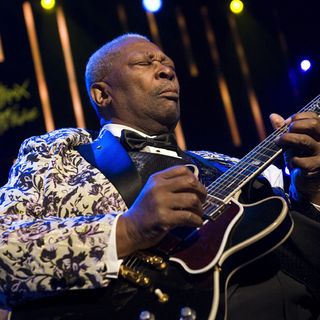
Night Life
“I was on a roll. Eric Clapton played with me at the Royal Albert Hall last year (for Further On Up The Road), so I said to myself, 'What the hell? Let me see if my luck will continue.' I called up Mr King - that’s what I call him, even though he’s a dear friend - and I said, 'Um, would you possibly consider playing on my new record?' To my surprise, he said yes.
“We were thinking of two songs, Buzz Me and Night Life, both of which are on BB's album Blues Is King (1967) but I chose Night Life because I think it’s more iconic.
“BB cut his parts in Vegas. The guy works more than I do; he can’t just jump on a plane to Greece. He nailed his takes and was incredible. Then it was up to me to see how I could compete with him.
"The truth is, you can’t. But you do play and sing harder - not just harder but smarter. Come on, you’re paired with BB King. He’s gonna trounce you. Look for your spots to shine.”

Wandering Earth
“It’s my five-part blues. I always wanted to write a song in which nothing was repeated, so I painstakingly put this one together.
“It was pretty hard. To write something that’s a song, that’s cohesive and flows, that's melodic and tells a story and isn't just a bunch of disconnected sections… Not so easy.
"The band dug it. I think Anton nailed it in one or two takes, so that spoke to me, like, 'Great. I pulled it off.' The fact that the guys weren't scratching their heads meant I had something cool. I really like the solo too. I picked up the Firebird and threw caution to the wind. Overall, I'd say it came out pretty nice, so sometimes simpler isn‘t always better.”
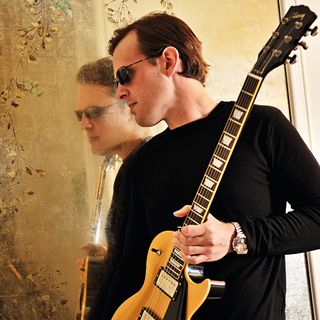
Look Over Yonders Wall
“This is me having my Freddie King moment. A few people covered this song, but to me, Freddie King’s version was the classic, and I knew I could have a lot of fun with it.
“When I hear this song, I picture mod girls in London in 1967 wearing go-go boots and dancing on those black-and-white TV shows; or guys in funky clothes gettin’ down - you know, like Freddie King. It’s just a blast. You’re in a bad mood? Put this song on, it’ll cheer you up."

Athens To Athens
“Even though I wrote it in Greece, I was very inspired by Ry Cooder’s Cherry Ball Blues, which, believe me, can take you a lot of places, but Greece is not one of them.
“Originally it was an instrumental, but Kevin said, ‘Put a vocal on it.’ He even came up with the title. I never thought of it as a vocal tune, but the minute he said it, I thought, 'Why not?'
“With the title in my head, I went off and wrote down the lyrics. Took me about a hour. That’s probably long for writing lyrics. I’m always of the mind that they should come in one short burst.
“I played acoustic on it and kind of doubled the melody line with my vocal. With the Greek instrumentation on top of everything, it came out real nice.”
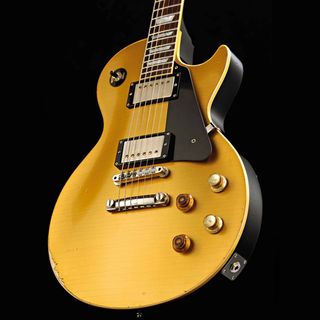
Blue And Evil
“Yes, it’s one of my own compositions, but I still don’t like it very much. In fact, it’s my least-favorite track. Oddly enough, it’s the most-requested song from the album so far. Every time we’ve played it live, people go nuts.
“What’s the lesson here? That I never would have made it as an A&R guy. When it comes down to choosing what the public wants, I’m clueless. Good thing I never tried out for Clive Davis’ job!
“I don’t mean to go off, but I just think it’s generic. But the band loved it and Kevin thought it was great, so I was like, ‘Fine, we’ll put it on the album, but that doesn’t mean I’m gonna like it.'"

Baby You Gotta Change Your Mind
“It’s a sweet little Blind Boy Fuller song. If it sounds a little loose, well, there’s a very good reason for that. We recorded it during our album-wrap celebration, and everybody was in various states of intoxication.
“We had this massive barbecue on the back porch of the studio, with all these drinks and about 20 bottles of wine. Before you knew what was going on, guitars started coming out and we were playing. Get alcohol and musicians together and that's what happens.
“Anton, I think he was he was scratching his drumsticks on a wicker chair; Rick, our keyboardist, was banging on something while he was whistling; and I was singing and playing lead guitar. Meanwhile, Kevin directed the whole thing.
“Given the circumstances under which we recorded it, it’s a little ramshackle, but it’s got spirit. A neat capper for the album. Listen to it and go back to the beginning again - that's what I say."
Come back next week when Joe talks MusicRadar through his favourite bluesmen ever.
Liked this? Now check out Play blues guitar like Joe Bonamassa
Buy Joe Bonamassa's Black Rock here: HMV | iTunes | Amazon
Connect with MusicRadar: via Twitter, Facebook and YouTube
Get MusicRadar straight to your inbox: Sign up for the free weekly newsletter

Joe is a freelance journalist who has, over the past few decades, interviewed hundreds of guitarists for Guitar World, Guitar Player, MusicRadar and Classic Rock. He is also a former editor of Guitar World, contributing writer for Guitar Aficionado and VP of A&R for Island Records. He’s an enthusiastic guitarist, but he’s nowhere near the likes of the people he interviews. Surprisingly, his skills are more suited to the drums. If you need a drummer for your Beatles tribute band, look him up.

"It may have bothered him that people didn’t recognise his guitar virtuosity, which might be why the song devotes so much space to his shredding": A music professor breaks down the theory behind Prince's When Doves Cry

“It didn’t even represent what we were doing. Even the guitar solo has no business being in that song”: Gwen Stefani on the No Doubt song that “changed everything” after it became their biggest hit

"It may have bothered him that people didn’t recognise his guitar virtuosity, which might be why the song devotes so much space to his shredding": A music professor breaks down the theory behind Prince's When Doves Cry

“It didn’t even represent what we were doing. Even the guitar solo has no business being in that song”: Gwen Stefani on the No Doubt song that “changed everything” after it became their biggest hit
Most Popular







